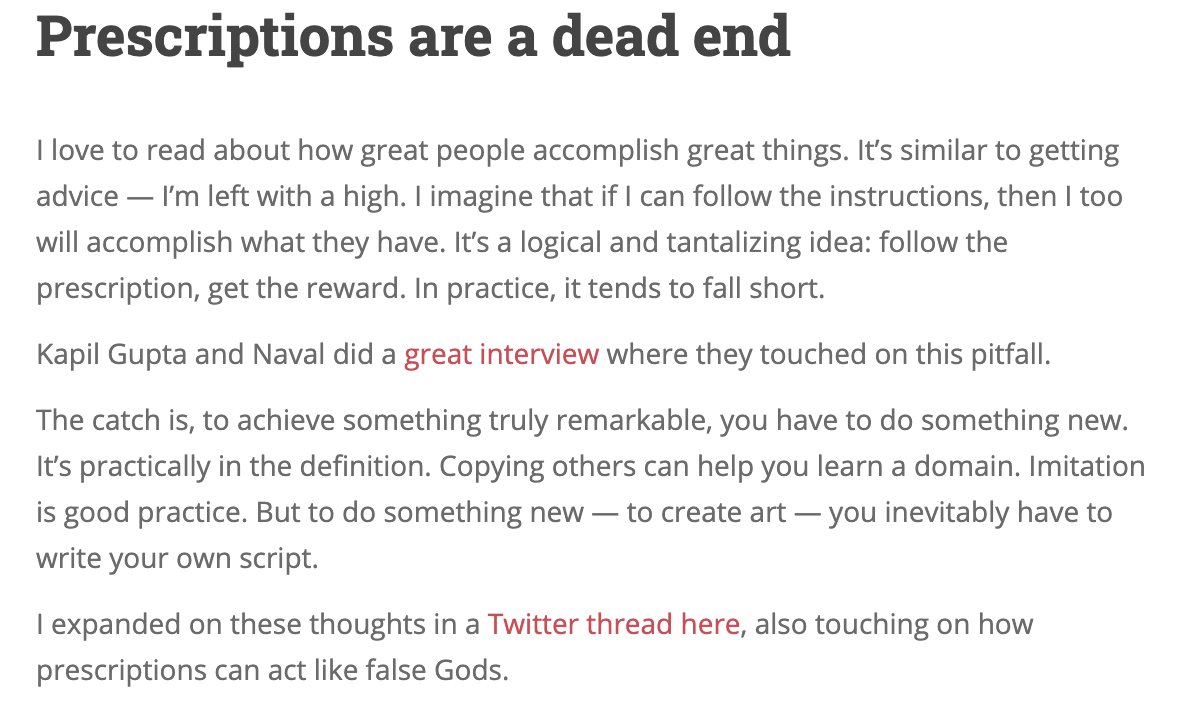In a podcast between @naval and @KapilGuptaMD, one useful concept they discussed was "prescriptions"
I constantly fall into its trap, and you probably do too...
I constantly fall into its trap, and you probably do too...
A prescription is essentially any "how-to". Techniques, guides, hacks, and methods. Anything with a promise of getting you from A to B
It can be a literal guide. Or looking at examples of what others have done in the past. Or asking for advice.
It can be a literal guide. Or looking at examples of what others have done in the past. Or asking for advice.
The problem with prescriptions is it's easy to get confused with the situations where they work and where they don't.
Specifically, prescriptions tend to work when you're trying to accomplish something "mechanical". This tends to mean anything that doesn't involve other people.
Specifically, prescriptions tend to work when you're trying to accomplish something "mechanical". This tends to mean anything that doesn't involve other people.
You can follow prescriptions to successfully fix a car, or even grow a tomato. You can more or less master these tasks by following prescriptions. They work when you engage with a system that (mostly) doesn't engage back.
Prescriptions fail when you're dealing with a reflexive system ⏤ one that intelligently adapts to you.
You can't follow prescriptions and expect guaranteed success with the games that humans play: relationships, business, art, sports, etc.
You can't follow prescriptions and expect guaranteed success with the games that humans play: relationships, business, art, sports, etc.
The tricky thing is, while prescriptions won't get you to the top of these games, they can be useful.
You can't follow a How To and become a top athlete or business man. But you can learn what to practice and how to practice it by studying the greats.
You can't follow a How To and become a top athlete or business man. But you can learn what to practice and how to practice it by studying the greats.
And here's where it all goes wrong.
We start focusing on the How To, and too easily lose sight of the actual end goal. The prescription ⏤ the training regimen ⏤ becomes the object of our desire. To execute it perfectly. And just like that, we become robot instead of artist.
We start focusing on the How To, and too easily lose sight of the actual end goal. The prescription ⏤ the training regimen ⏤ becomes the object of our desire. To execute it perfectly. And just like that, we become robot instead of artist.
The prescription becomes a God. The more time we spend focusing on it, the more we forget about the goal. And as a result, we lose any hope of achieving the goal.
A useful exercise:
In relationships, business, sports, really anything in life: stop and check if you're chasing a prescription rather than an outcome you care about.
In relationships, business, sports, really anything in life: stop and check if you're chasing a prescription rather than an outcome you care about.
We seek to master sword fighting in order to do one thing well: kill our opponent with the sword.
In the process, we begin to practice the many individual skills of sword fighting. To hit, to parry, etc.
All useful skills, but not the point of wielding a sword
In the process, we begin to practice the many individual skills of sword fighting. To hit, to parry, etc.
All useful skills, but not the point of wielding a sword
I run into this problem constantly when trying to design product for my startup.
When faced with a particular problem or goal, my first instinct is still typically to go and look at how others have solved something similar.
When faced with a particular problem or goal, my first instinct is still typically to go and look at how others have solved something similar.
I'm immediately jumping to studying prescriptions. In the process, it's easy to bias myself to How Experts Have Done This Already. It becomes too easy to mimic rather than try to think new thoughts and solve a problem in the one unique way that fits it perfectly.
Another useful exercise:
When facing a problem, try to craft a solution from scratch before doing anything else. This gives you a chance to let out your inner artist.
Only look at prescriptions after you've looked at the problem with untainted, fresh eyes.
When facing a problem, try to craft a solution from scratch before doing anything else. This gives you a chance to let out your inner artist.
Only look at prescriptions after you've looked at the problem with untainted, fresh eyes.
What separates a true artist from mimicry is the ability to keep returning to the vision of what you're trying to create.
Yes, you can step away and look at examples, or ask for feedback, or practice a relevant skill. But after each detour, you must return.
Cut the enemy.
Yes, you can step away and look at examples, or ask for feedback, or practice a relevant skill. But after each detour, you must return.
Cut the enemy.
Was on the front page of HN yesterday morning. Some good comments here: https://news.ycombinator.com/item?id=23623306
Got 5000+ views that only generated 2 newsletter subs. Interesting traffic.
Got 5000+ views that only generated 2 newsletter subs. Interesting traffic.

 Read on Twitter
Read on Twitter



